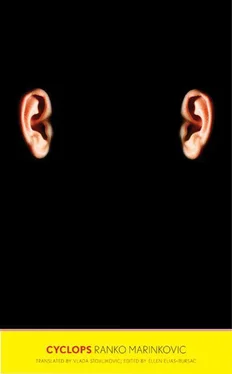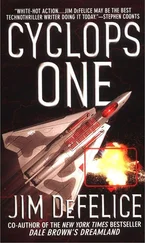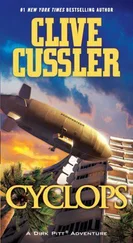“Well, there are losses beside sweating,” the invalid smiled at Melkior, “I don’t have to spell it out, do I?”
“Losses beside sweating …” repeated Dom Kuzma, unthinking. Having noticed Melkior by his side, he began to stuff his belongings back into his pockets in embarrassment. All of a sudden he raised his head toward the invalid, radiant with joy: “You were right, friend, I had an orange in my pocket last night! That’s the sixty grams!” He stepped down with a smile, full of unexpected optimism. But the devil relished spoiling his joy: “All the same, I do have my doubts about your machine …” He went off entirely unhappy.
“God give me strength!” sighed the invalid with relief. “Yes, sir.”
Melkior lay a one-dinar coin shamefully on the cover of the little box and went away without stepping onto the machine.
“What about the weighing?” said the owner of “the equipment” in surprise: it takes all kinds …
“No need,” said Melkior, more or less to himself. Davos, the glaciers … white all around and a tinge of illness … there was no need for anything. He felt shame and anger. The Cyclops Polyphemus, the beast, now treads the Earth! (He was foaming at the mouth.) A stinger and wasp’s venom … so I could stab his gorge …
He noticed what he was saying and it struck him as comical. But laughter was deaf at his observation. Laughter is a robot anyway! he said angrily.
But the sound of laughter came … from somewhere close, so near as to surprise him: where did the echo come from?
“Your attention, heh, heh, heh …”
All of a sudden there materialized before him a leering drunken face with dark fillings. Ugo was leading a mob of drunks picked up in dives along the way … a noisy and motley crew, from ragamuffins like Four Eyes to the elegant dandy Freddie. What’s this combination, now? wondered Melkior. As a matter of fact, Freddie was rather standing “aside” (not his crowd), but Four Eyes kept addressing him as “Your Highness” and attempting to fling an arm around Freddie’s shoulders.
“Your attention, lowlifes,” spoke Ugo to the mob, “here’s our Conscience — bow down!”
Four Eyes bowed humbly, who knows, it might turn out to be a wise move. An unshaven and dirty individual laughed in his face.
“Cut the cackling, Shitface!” Four Eyes warned him. “He’s got more in his little finger than …” He was remembering the drinks on Melkior at Kurt’s Cozy Corner … ahh, those had been the days!
“Shut up, Basilisk!” Ugo snapped at him, “you always ruin everything!”
“Yes, Master …” Four Eyes looked around the mob, honored: he had acquired a moniker.
“Welcome at long last to our midst, oh, Sun!” Ugo waved his arms fawningly, “we’re lost without you! Just say the word and … Where shall we go?”
“To …” Melkior opened his mouth, but rage rent all his words. In his dry, bitter mouth he felt the vexing taste of a kind of spite; a brackish vengeful hatred which had long been gathering momentum inside him burst its inarticulate, savage, animal-like, speech-deprived way into his mouth, and he spat it out unconsciously, dryly, almost symbolically, right in Ugo’s face which was grinning fetchingly before him in confident expectation.
This is what Freddie had been waiting for: he rushed in first (to settle accounts with the pen-wielding artist at last!), the others followed. … Get the weirdo!
Ugo elicited Melkior’s admiration once again. He never even winked after being spat on — he only gave him a moist, blurred look. He then calmly turned to face the mob and stepped in front of Melkior spreading his arms in protection:
“Over my dead body!” he said resolutely. “Shitface,” who had been spoiling for a fight, cursed. “Quiet! And everyone to his proper place! There’s a higher form of justice, this is not your calling. Fredegarius, resheath your pinewood prop sword! Open the ranks, make way for Eustachius the Magnificent!”
The mob parted obediently, and he made a gracious gesture, waving Melkior through.
It’s a hoax … thought Melkior, distrustful. (Freddie was smirking insidiously from the side.) But there was nothing to be done, he had to go … His back broke out in goose bumps, expecting blows … He passed halfway through the gauntlet; nothing happened (this is how people used to be flogged); he reached the end; this is where it starts … But there was nothing, not a thing, not even a single nasty poke …
O Parampion! He felt like turning back and giving Ugo a hug. But he was still not convinced. And once he’d been convinced he still thought: it could just as well make the madman regret what he’d just done …
“And now, you crew of good-for-nothings, forward to new adventures!” he heard Ugo command behind him. But there was a despondent and sad undertone to the voice, like a desperate call after something that had been lost … or so it seemed to Melkior.
He now wished only to move on around the next corner, as if there were a different world there.
Everything was the same around the next corner. The street, the infrequent passersby with half-frozen noses. (It was the sixth of April — some spring!) They were watching the random Sunday passersby with indifference. Idle, useless watching. … Was that war — people looking on, indifferent, dull? Had they stared at Sunday mornings before? — He could not recall. Ugo is talking gibberish — the war is invisible.
An aeroplane droned very high overhead. There it is, said Melkior. Solitary onlookers were gathering into knots as if an accident had taken place, raising their noses. “Reconnaissance,” explained an expert (everybody was listening trustingly), “he’s flying solo at a great altitude — he must be on a reconnaissance flight. Photographing. The bombers follow later … And our anti-aircraft fellows are not lifting a finger …”
The man barely said the words before guns started booming. The aeroplane was a tiny toy high among the clouds. Small white cloudlets blossomed beneath it. … “He’s too high — they’re wasting their ammo,” said the expert.
Should they save it for Christmas then? thought Melkior irascibly. Let them boom on!
Funny, the rumbling … (he walked away with derisive thoughts) … as if we were celebrating something down here …
“It’s not very wise to stand around in the street,” he heard the expert behind him, “shrapnel comes down all over.” Melkior drew closer to the façades … as if it were raining, he laughed at his prudence.
“Keep away from the wall!”
A soldier — a sentry — was standing in front of him, on his rifle a bayonet, on his head a helmet. Over the gate was dejected gray lettering on a dirtied gray background: GARRISON COMMAND.
“Keep away, you hear!” The soldier was already unslinging his rifle.
“I’m going in,” Melkior told him uncaringly and tried to enter.
“Wait!” bawled the sentry rudely, then yelled into the gate: “Sarge!”
Out came a young, emaciated man, his face sickly but his eyes keen and feverish.
“This one here,” the sentry tilted his head at Melkior.
“What do you want?” asked the sergeant, irritated.
“To see the Orderly Officer,” replied Melkior importantly. This must be the place, he thought.
“You’re looking at him.”
“Your superior,” said Melkior.
“Can’t see you. He’s busy. There’s a war on, if you hadn’t noticed.”
“I’m on official business.”
“What kind?”
“Important.” Saying this, Melkior smiled and, so it seemed, gave a slight wink.
“C’mon in.” Outside one of the doors the sergeant said: “Wait.”
A long empty corridor with a floor scarred by army boots, a row of gray doors opposite which tall windows looked out on a barren, mournful yard. Why is everything so hopeless in here? Melkior was about to leave, but then the door opened and the sergeant said: “Come in.”
Читать дальше












